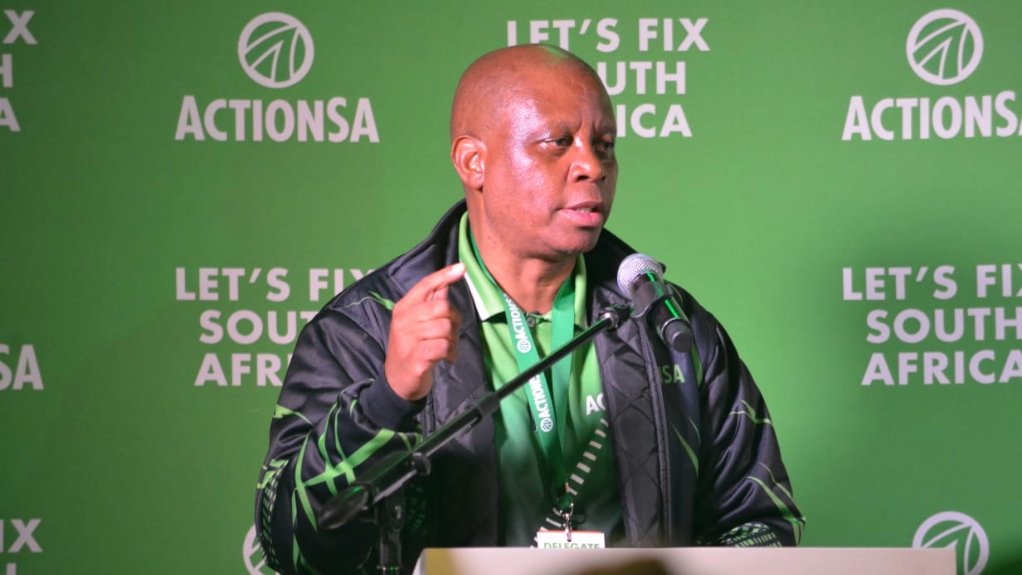ActionSA president Herman Mashaba announced on Wednesday that the party’s action plan to end loadshedding will focus on unleashing the potential of independent power producers (IPPs) in a competitive energy market, while taking measures to fix Eskom.
Mashaba was speaking at the Department of Mineral Resources and Energy headquarters in Pretoria, while submitting the party’s comments on the draft Integrated Resource Plan (IRP) 2023 ahead of the March 23 deadline.
Mashaba said he rejected the IRP in its current form as it failed to address South Africa’s energy crisis with any sense of urgency, condemning the country to loadshedding until at least 2030.
If ActionSA comes into power, it plans to end cadre deployment at Eskom, and ensure that the entity is staffed with skilled people, appointed on merit and competency, and not political affiliation.
He said ActionSA planned to combat crime in the energy system by improving security measures to protect the energy grid against cable theft and infrastructure damage. It would also shield critical services from rolling blackouts and decentralise the energy market.
He promised the establishment of a competitive energy market to open the market to IPPs to generate electricity.
ActionSA’s plan will harness solar power, transition to renewable energy and promote public participation, while also enhancing skills development.
Mashaba noted that loadshedding remained one of the biggest self-made disasters by the ruling party African National Congress (ANC) as it destroyed the economy and thousands of jobs.
He noted that the notion that loadshedding had improved is “complete nonsense”, highlighting that in 2023, South Africans experienced 332 days of rolling blackouts, with a mere 33 days without rolling blackouts in an entire year.
This, Mashaba said, was the worst loadshedding the country had ever experienced, despite government burning R24.3-billion worth of diesel to keep higher stages of loadshedding at bay.
“During the same period, however, the private sector and citizens added just short of 3 000 MW of solar power to the South African grid – equivalent to three stages less of loadshedding. The bottom line is that 17 years since loadshedding was first introduced in 2007, the ruling party has failed to make the investments necessary to solve the problem, leaving the private sector and citizens to take action and to fix the problem,” he said.
STABLE ELECTRICITY SUPPLY
Mashaba expressed confidence in the party’s plan to end loadshedding, saying it had witnessed real-world examples of where it had been implemented.
During a visit to the Free State, in February, Mashaba said he met with the team from Rural Free State (known as RFS) in Frankfort, which is the electricity distributor in the region, on behalf of the Mafube local municipality.
He alleged that RFS was currently halfway through a 25-year contract to manage electricity distribution and collect revenue in the municipality and had invested heavily in new infrastructure to ensure a stable electricity supply.
He noted the team had constructed a solar farm which generated 4.2 MW of electricity, almost 75% of Frankfort’s electricity requirements, which he said meant that the town was slowly becoming free of loadshedding.
And once the contract with the Mafube local municipality ended, all infrastructure developed by RFS would become the property of the municipality, he said.
“This is a real-world example of how the private sector has stepped us fix loadshedding where government could not. Since taking over the electricity distribution and revenue collection, losses had dropped from 50% to 5%, with the remaining 5% largely being of a technical nature,” highlighted Mashaba.
ActionSA believes this can be successfully rolled out in municipalities across the country as a viable economic model to ensure a stable electricity supply to residents to ensure that jobs are protected.
Mashaba noted that the partnership between government and the private sector could help overcome the myriad challenges facing the country.
EMAIL THIS ARTICLE SAVE THIS ARTICLE ARTICLE ENQUIRY
To subscribe email subscriptions@creamermedia.co.za or click here
To advertise email advertising@creamermedia.co.za or click here











